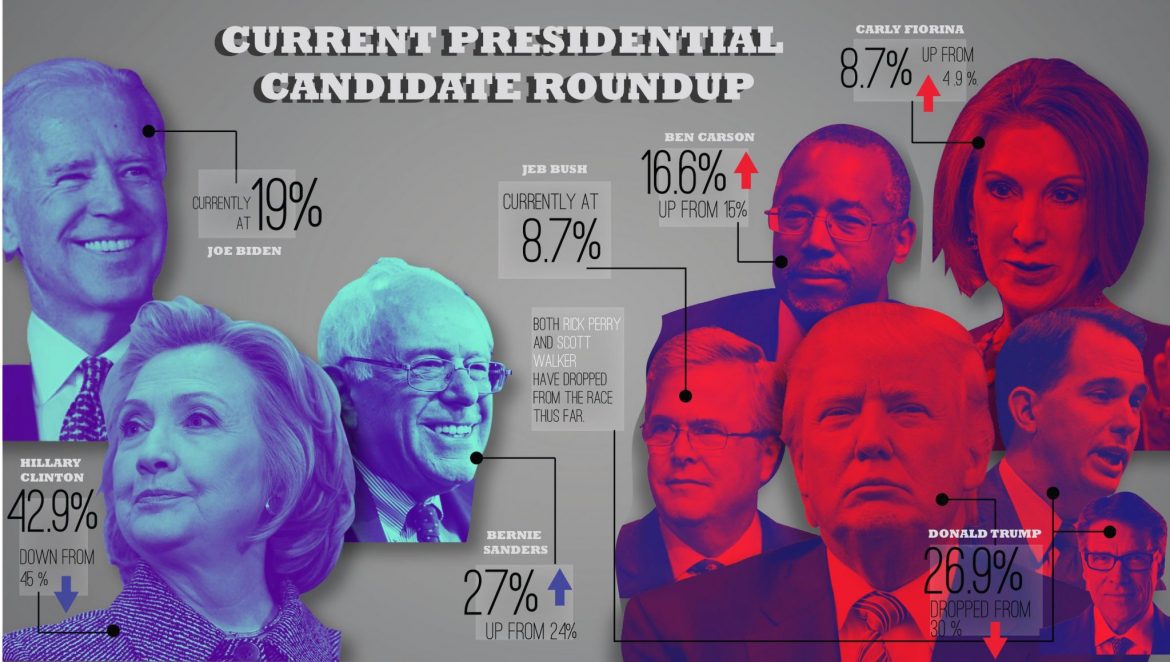On Sept. 11, former Texas Governor Rick Perry dropped from the Presidential race. After campaign staff cuts and pay reductions, Perry’s departure from the race did not come as a surprise to many. Nearly a month earlier, on Aug. 14, Politico reported that “40 percent of early-state Republicans and nearly half of early-state Democrats believe Rick Perry will be the first candidate to drop out of the presidential race.”
Just ten days after Perry made his announcement, Wisconsin Governor Scott Walker, who was once widely considered a front-runner for the Republican nomination, suspended his campaign efforts as well.
“Basically, Walker has turned out to be a relatively weak campaigner,” Dr. Steven Breezeel, associate professor of political science, said. “In a lot of ways, he struggled to find a consistent message … and ran into some fundraising trouble when fundraising often chases performance.”
In the most recent poll average by the Huffington Post, businessman and Republican candidate Donald Trump has dropped to 26.9 percent from 30.8 percent in early September. Ben Carson, who polled at 15 percent on Sept. 7, has risen in the polls to 16.6 percent. Carly Fiorina, former CEO of Hewlett-Packard, has made a substantial jump in the same poll average. A pre-CNN debate polled Fiorina at 4.9 percent behind five other candidates, but a well-received debate performance has moved Fiorina to 8.7 percent, tied in third place with former Florida Governor Jeb Bush.
A notable trait among front-runners Trump, Carson and Fiorina is the fact that all three are considered anti-establishment candidates, meaning they do not carry the political baggage and connotation of long-lived politicians in Washington, D.C.
“In my opinion, the reason anti-establishment candidates are popular is because people are frustrated with lifetime politicians,” junior social science major Noah Watson said. “Whether it’s because of media hype or policy issues, people are just frustrated.”
For the Democrats, a continued trend is visible. Former Secretary of State Hillary Clinton, according to the HuffPost Pollster, is slowly declining in the polls. With 45.8 percent support on Sept. 7, Clinton has now dropped to 42.9 percent, but still holds the first place spot over her fellow candidates.
Senator Bernie Sanders, whose rise in the polls has surprised many, continues to gain on Clinton. Whether it is his self-proclaimed socialist platform or his resonation with millennials, Sanders is certainly capturing the attention of voters and campaign strategists.
“It is absolutely amazing to me to see the Democratic Party seriously considering (Sanders), a guy who has laid claim to the title of socialist as a member of Congress, as their nominee,” said Breezeel. “(For the Republican nomination), I think that we’ll probably end up with someone who is less of an outsider than we think; I would guess that it is probably going to be Rubio.”
Eyes are still on Vice President Joe Biden, who many believe will be announcing his candidacy. However, some consider the recent loss of his son, Beau Biden, as a major factor in his decision, stating the emotional toll of such a loss could lead to his decision not to run.
To students, Breezeel and Watson urge awareness and activity in the coming election.
“The decisions made of those you elect to office, whether it be local, state or federal, effect how you live your life,” Watson said. “It’s not just some decision you’re making about someone who doesn’t impact you, but it’s a personal decision that influences how you live.”
In May, the Arkansas legislature voted to move the Arkansas primary date from May 31, 2016, to March 1, 2016, also known as Super Tuesday. Twelve other states’ primaries will also be held on that date.
